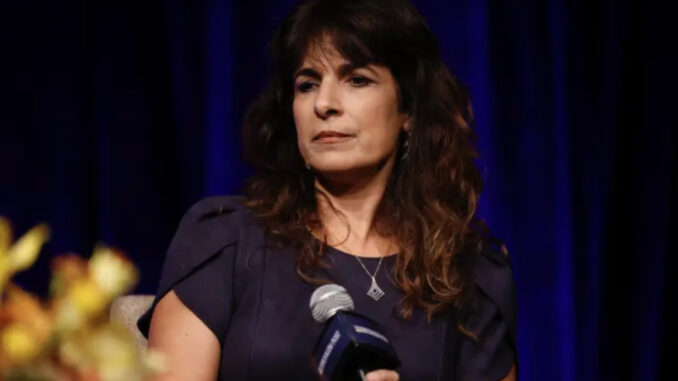No. 42 on The Jerusalem Post’s Top 50 Most Influential Jews of 2022: Shurat HaDin founder Nitsana Darshan-Leitner.

Shurat HaDin founder Nitsana Darshan-Leitner
Once upon a time, it was mostly terrorism financers who rued the day that Nitsana Darshan-Leitner founded Shurat HaDin – Israel Law Center in 2002. The organization has won mega-judgments against Iran, Syria, North Korea and the Palestinian Authority (though the PA judgment fell on appeal).
These days, to the list of people who would be happier if they did not have to face off with Darshan-Leitner, you could add a new, unexpected face: Ben & Jerry’s.
In July 2021, the company announced that it would cease selling ice cream in the West Bank, to protest Israel’s settlements there, as part of the Boycott, Divestment and Sanctions campaign.
Using legal tools, Darshan-Leitner has been fighting BDS for years, such as litigation that helped convince Airbnb to reverse a policy of boycotting Judea and Samaria.
Shortly after the announcement by Ben & Jerry’s, Shurat HaDin declared that Ben & Jerry’s had “abandoned” its trademark in the West Bank. Following this declaration, Darshan-Leitner registered a commercial entity with the Israeli registry of corporations called Judea and Samaria’s Ben & Jerry’s.

Ben & Jerry’s ice creams on sale at a shop in Jerusalem on July 19, 2021. (credit: YONATAN SINDEL/FLASH 90)
The plan was to sell “Judea and Samaria’s Finest Frozen Chosen People,” complete with a portrait of Theodor Herzl, the founder of the modern Zionist movement. Darshan-Leitner explained to The Jerusalem Post that under US trademark law, a trademark is “protected only if you show a sincere intention to work in the area where you want your trademark to be registered. If Ben & Jerry’s had shown that it was not interested anymore, then they waive their rights.”
“Unilever [the Ben & Jerry’s parent company] warned us not to do so. We held off until the end of the contract between Ben & Jerry’s and its Israel franchise. We wanted to know if it would end between both of them,” she said.
The Israeli side of Ben & Jerry’s “filed a lawsuit against Unilever in the US. Unilever reached a settlement, agreeing to sell the right to sell Ben & Jerry’s ice cream, with some limitations: not to use Ben & Jerry’s in English, only in Hebrew; to use new flavors, not the flavors with the same names,” she said.
The saga is not over.
Ben & Jerry’s is trying to fight Unilever’s sale of the West Bank franchise in the US courts, but Ben & Jerry’s lost the first round, which means that Darshan-Leitner may yet have the last laugh on the issue.
In the meantime, Darshan-Leitner helped facilitate “another initiative to expose the hypocrisy of Ben & Jerry’s.”
In August, over 1,000 Israeli university students demanded that the ice cream company recognize the land on which its Vermont factory sits as “illegally occupied” and evacuate it immediately.
In the letter written on behalf of “Students for Justice in America,” the students stated that they were “deeply concerned about safeguarding human rights and the oppression of indigenous peoples in North America.”
They explained that their “research and investigation have determined that the land that the Ben & Jerry’s corporation operates from in Vermont, 30 Community Drive in South Burlington, 1281 Waterbury-Stowe Road, Route 100 in Waterbury and 900 Industrial Park Road in Saint Albans, is territory that belongs to the Abenaki people.”
“We know they are calling to Jews to vacate Judea and Samaria. We call upon Ben & Jerry’s to evacuate their factories in Vermont because this is occupied territory,” she said.
This is “not a war against ice cream. It’s about the BDS movement and its hypocrisy… forgetting that American factories and corporations are sitting on occupied territory. Even though it happened 200 years ago, it is still an open wound in American society. There is litigation on it with lawsuits by Native Americans against American places.”
She added, “Universities put plaques to announce which land was taken from which Native American tribe. Americans show regret and discuss it constantly. It is no different than this conflict over Judea and Samaria. So we can put up plaques and have discussions on it, and those who want to can even express regret, but we have a right to sit on this land as long as America has the right to sit on land occupied from the Native Americans.”
How did Darshan-Leitner come up with these creative, unprecedented legal tools, whether against Ben & Jerry’s; Airbnb; social media giants, for providing platforms for terrorists to communicate; blocking pro-Hamas Gaza flotilla ships from getting insurance; or using the US Anti-Terrorism Act to try to go after the assets of organizations and states connected with terrorist attacks that killed or harmed US citizens in Israel?
“We have a secret weapon. It’s called the Jewish sechel [smarts or cleverness]. We are fighting against anarchists and an enemy that does not refrain from using any weapon to undermine the right of the Jewish people to reside on its land and live in its independent country in a Jewish homeland,” she said.
“Therefore,” Darshan-Leitner said, “we also have to think out of the box and come with weapons to combat anarchists. When you go into a [legal] war against a movement, you cannot go with your hands tied behind your back. You need to be creative.”
She confided that some of the best ideas have come up when she and her husband, Avi, are just sitting on the couch at home when randomly one of them tosses out a seemingly harebrained new idea, and “the other says: ‘Wait, wait, wait – it’s too extreme!’ The other says it’s not too extreme,” and then, once they both think about it, the other agrees that it could work.
BESIDES THE new fields into which Shurat HaDin is constantly branching off in order to fight for Israel or Jewish people-related causes, it pressed on with its bread-and-butter cause of winning anti-terrorism judgments with another huge judgment against Iran and Syria from a US District of Columbia court in August.
Darshan-Leitner was representing the family of Taylor Force, a West Point graduate and business student who was stabbed to death by a Hamas terrorist in Tel Aviv in March 2016; the family of former school principal Richard Lakin, who was murdered by two Hamas terrorists on a Jerusalem bus in October 2015; and the family of Avraham Moses, a 15-year-old high-school student who was shot to death in Jerusalem in 2008.
The court granted awards of $171,403,803 in compensatory damages and an additional $342,807,606 in punitive damages.
She was proud of this win also because she said it showed Hamas’s involvement in the “knife intifada” of 2015-2016, so that many of the attacks attributed to lone-wolf attackers were not as separate from the terrorist group as some have presented.
This past year, Shurat HaDin has also won a number of major judgments in the Israeli courts against terrorist groups.



Leave a Reply
You must be logged in to post a comment.